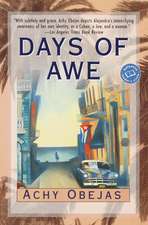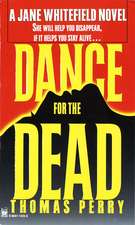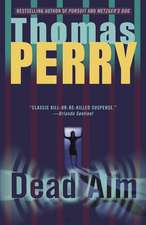Death Benefits
Autor Thomas Perryen Limba Engleză Paperback – 31 oct 2001
Preț: 51.10 lei
Nou
Puncte Express: 77
Preț estimativ în valută:
9.78€ • 10.46$ • 8.15£
9.78€ • 10.46$ • 8.15£
Carte disponibilă
Livrare economică 27 martie-10 aprilie
Preluare comenzi: 021 569.72.76
Specificații
ISBN-13: 9780804115421
ISBN-10: 0804115427
Pagini: 372
Dimensiuni: 107 x 175 x 30 mm
Greutate: 0.19 kg
Editura: BALLANTINE BOOKS
ISBN-10: 0804115427
Pagini: 372
Dimensiuni: 107 x 175 x 30 mm
Greutate: 0.19 kg
Editura: BALLANTINE BOOKS
Notă biografică
Thomas Perry won an Edgar for The Butcher’s Boy, and Metzger’s Dog was a New York Times Notable Book of the Year. His other books include Blood Money, The Face-Changers, Shadow Woman, Dance for the Dead, and Vanishing Act. He lives in Southern California with his wife and two daughters.
Extras
Ellen leaned forward over the sink and took a last, critical look at her makeup in the bathroom mirror. She could see that the eyes were good. The way to look trustworthy was to look trusting, and her eyes seemed big and blue and wide-open. The color on the cheeks was good, too: she could tell it was clear, smooth, and natural, even though the mirror was pocked with black spots, and the light in here was harsh and yellow. But she intended to be there early enough to slip into the ladies' room, do a recheck, and make any necessary revisions before she was seen. She had been training herself not to take anything for granted since she was nine years old, and she was twenty-four now. Not to anticipate problems was to invite them.
She went back into her kitchen, picked her purse off the table, and slung it over her shoulder, then opened her thin leather briefcase to be sure she had everything. She always carried a small kit consisting of the brochures and forms necessary to commit a customer to one of the common policies: term life, whole life, health, home owner's, auto. Before she had left the office last night, she had added some of the more exotic ones to cover art, jewelry, planes, and boats. The application forms she carried always had her name typed in as agent, with her telephone extension and office and e-mail addresses in the other boxes, and her signature already in the space at the bottom. She never left the home office in doubt about who should get the commission.
Clipped to the inside of her briefcase she carried a slim gold pen that felt good in a customer's hand when he signed his name, and she kept an identical one, never used, out of sight below it so there could never be a moment when she was ready to close on a customer and couldn't. Taking a few simple, habitual precautions was usually enough to keep her from lying in bed at night worrying about lost opportunity, failure, and humiliation.
She reached into the other side of the divider in her briefcase, pulled out the claim forms she had prepared, and examined them. She was not proofreading the entries. She knew there were no mistakes. She had been up late, studying the files, filling in the blank spaces on the forms with a typewriter, so there would be no real paperwork left to do. This morning she used the forms to test her memory of family names, addresses, dates.
She had no illusion that she was engaged in anything but an act of dissimulation. It was conscious, studied, and practiced, and anything less than a flawless performance would be a disaster. When she had all the personal details by heart it made her listener feel as though she cared about him. Having them wrong was to be caught out as a hypocrite and a fraud. If she convinced her listener that she cared--really had his interests at heart--then she was not halfway there, she was all the way.
Ellen made sure the coffee was unplugged and the lights were all off before she went out the door and locked it. As she turned, she heard a sudden noise over her shoulder and jumped. She stared in the direction of the sound, and decided it was nothing--just an orange falling from the tree in the corner of the yard. But it was still an hour before the sun would be up, and even Pasadena could be a bit creepy in the darkness and silence.
She knew that if she screamed, she couldn't expect the other four girls who lived in the small apartments in this building to come to her rescue, but they would at least wake up and look out their windows to see what was going on. If somebody grabbed her, she must not rely on her neighbors' altruism. She must yell "Fire!" while she fought. She had read that this was what the experts advised, and so that was what she would try to do.
She wished she weren't feeling so jumpy. For the past two days she had been increasingly anxious, and the discomfort seemed to have gotten more vivid this morning. She had to remind herself that this was not something to be afraid of. It was an opportunity. If she used it well, it was a step toward getting everything she wanted.
She looked down the empty driveway at the street, then stepped toward the open garage where her car was parked, and took the time to check and be sure the car was locked. This compulsion to check everything made her a bit ashamed. She had not just been worrying about accomplishing what she had to do this morning. She had been having feelings that something was wrong. At times, she had detected the sensation that someone was watching her. Yesterday she had been walking down the street in Old Town, looking in shops not far from the office, and had sensed eyes on her. She had stopped abruptly, pretending to look in a store window, and studied the sidewalk behind her in the reflection. She had waited until the other pedestrians had walked past her and had determined that they all appeared harmless before she moved on. She had told herself that she had just sensed some man staring at her. They did that, after all, and they meant no harm. But she had not convinced herself: when they meant no harm, they were always easy to catch. They wanted to be caught.
She made her way down the driveway to wait for the cab to arrive. She glanced at her watch. It was still not even five a.m. There was no reason to feel impatient. The cab wasn't late; she was early. Probably she had been spending too much time alone lately.
She defended herself from her own accusation. The isolation had not really been her fault. Even after a year here, the people in the Pasadena office were still the only people she knew in southern California. She had seen at the beginning that none of them were likely to become close friends. At best they were allies, and at worst they were obstacles, fixed objects she would have to work her way around. To get what she needed, she would have to deceive them about her feelings, keep certain information she picked up away from them, and use it to her advantage, all the while smiling and evading. She had done that. No wonder she was nervous.
She stared up the dark street, searching for headlights. In the heavy stillness of the residential neighborhood, she could hear distant engine sounds at the far end of the next block, where the street met Colorado Boulevard. Every few seconds, a car or truck would swish past the intersection, but none of them made the turn. The faintness of the sounds reminded her of how alone she was.
She had read an article in a women's magazine that said if a person had a feeling--an uneasy intuition that something was wrong, that a man she was with made her uncomfortable, that a place made her feel vulnerable--she should not ignore it. Her eyes had probably seen something, her ears had probably heard something, but her mind was trying to brush it aside and explain it away because denial was easier than facing the danger.
Ellen caught herself forming a clear mental image of John Walker. She could see his dark brown hair, his calm, wise eyes. She was sure it was the uneasiness that had brought him back. When she had been with him, she had always felt safe. It was not just because he was tall and broad-shouldered and physically fit. He had a quiet, thoughtful manner, and he was reliable. She felt a sharp pang that surprised her. She could have been with him--maybe not married him, because that would have ruined everything, but at least had him nearby. Driving over here before dawn to pick her up was exactly the sort of thing he would have done, and she would have known--positively known--that he would be here on time. She made an effort to push him out of her mind and obscure his image in her memory. The worst thing for a person to worry about was some decision she had made in the past.
She saw a pair of headlights turn off Colorado, took in a deep breath, and waited. The car passed under the first street lamp so she could see the white bar on the roof. It was the taxi. She let the breath out in relief. The cab began to make its way up the quiet street slowly. The driver must be searching for her house number, but he wasn't even on the right block yet. She stepped down to the street and waved her arm in the air. He didn't seem to be able to see her yet. He was still crawling along. How could he not see her? It was as though he were looking at every house, every stretch of sidewalk, to reach her by the process of elimination.
The cab crept to a stop at the end of the driveway. From here she could not see the driver's face, only a pair of big hands on the wheel in the soft glow from the dashboard. She hesitated. She reminded herself that she was being childish. She had called for a cab and here it was--she glanced at her watch--and it was actually early. The rest was just her overheated imagination.
She stepped toward the back seat of the cab, but the man didn't get out to open the door for her. He only waved his hand in a "get on with it" gesture. She pulled open the door, got in, and pulled it shut.
"I'd like to go to the airport, please."
"I know," he muttered irritably.
She began to regret calling a cab. It was a decision she had reached two days ago. She had made the call right away to reserve the cab, then repeated it this morning in case they forgot. She had meant to keep herself free and unencumbered this morning, but she could have driven her own car down there. A cab meant relinquishing control, and this driver was not very pleasant. At least the traffic would be light at this hour, so it wouldn't take very long. She could collect her thoughts before she had to start being convincing.
The cab pulled away from the curb and moved down the street. A few seconds later, she noticed that the back of the driver's head was easier to see, and then the mirror threw a bright reflection across his eyes. She saw him squint for a moment before he flipped the mirror up so the reflected glare was cast on the ceiling. Another car was behind them. She was surprised. She had not seen any car come off Colorado since the taxi had arrived, and she was almost sure she would have noticed if any of her neighbors had slammed a car door or started an engine in the silence.
The glow from behind did not go away, and ugly possibilities began to float into the front of her mind. She had heard that cab drivers who worked in the hours of darkness often got robbed. She had always imagined them being robbed because they were alone. But why wouldn't a robber strike when there was a passenger in the car? Certainly he would get more money, and she couldn't stop him. She looked at the back of the driver's head. He must know that he was a potential victim, but he didn't seem to be concerned. He did glance in the side mirror now and then, as though to verify that nothing had changed.
She waited for the driver to make the first turn, then another to head back toward Colorado, and looked behind. The car was still there. It had fallen back a bit, but it had not gone away. The driver turned again, and she waited. She counted to ten slowly, then extended it to twenty. The lights were visible again. Then it occurred to her that there was a reason why this might be happening, and she felt foolish for not thinking of it before. She worked for a big company in a competitive business. For over a year, she had been polite but aloof with her supervisors and colleagues. She had worked alone, developed her own leads, and pursued them. She had been earning commissions that were multiples of the ones other salespeople made. She had told her boss two days in advance that she would not be in today, because she was meeting a client. She had told him too much. She was amazed at herself for being surprised. Big companies spied on their employees all the time. Would it be so strange if the company had her followed?
She looked back. The car followed them onto the freeway entrance. "That car has been behind us a long time."
The driver said, "Really? I didn't notice." He looked into the side mirror again and shrugged. "Probably a cop."
"No," she said. "I don't think so. It's a compact car."
He was silent for a few seconds. "A lot of times, people who aren't sure where the airport is see a cab and follow. This time of day, you take a cab, that's probably where you're going."
It made no sense to her. He seemed to think she was a fool, and that made her panicky. "I know it's probably nothing, but it gives me the creeps. Can you please lose him?"
"How? We're on a freeway!"
"I don't know. Take an exit, then get back on, I guess. Nothing illegal or dangerous. I'll give you an extra twenty."
He looked behind, then pulled off the freeway at the next exit, went down the street a half block, and headed up the entrance ramp and back onto the freeway.
Ellen looked ahead for the car, then looked behind, and watched the ramp until the freeway curved and she could not see it anymore. No other car seemed to follow. She sat back and relaxed. "I think it worked."
The car radio crackled and buzzed, and she could hear a man's voice under the static. "Larry, where you at now?"
The driver lifted his microphone and held it so close to his mouth that Ellen could hear the amplified sound of his lips brushing it while he murmured, "Still on the One-ten south, heading for LAX." He fiddled with a dial on the radio. There was a lot of squawking and crackling, so that Ellen couldn't hear the dispatcher's next words, but she heard the driver say, "Okay."
Recenzii
“Compelling . . . A labyrinthine tale of murder [and] conspiracy.”
–People (page-turner of the week)
“MASTERFUL . . . INSURANCE HASN’T BEEN THIS INTERESTING SINCE JAMES M. CAIN WROTE DOUBLE INDEMNITY.”
–The Baltimore Sun
“FAST-PACED . . . A TOTALLY ENVELOPING READ . . . [that] relies on the wits of the characters rather than the hightech gadgetry.”
–The Denver Post
“RELENTLESS ACTION, SEVERAL INTRIGUING CHARACTERS, AND A WILD, SURPRISING FINALE.”
–St. Louis Post-Dispatch
–People (page-turner of the week)
“MASTERFUL . . . INSURANCE HASN’T BEEN THIS INTERESTING SINCE JAMES M. CAIN WROTE DOUBLE INDEMNITY.”
–The Baltimore Sun
“FAST-PACED . . . A TOTALLY ENVELOPING READ . . . [that] relies on the wits of the characters rather than the hightech gadgetry.”
–The Denver Post
“RELENTLESS ACTION, SEVERAL INTRIGUING CHARACTERS, AND A WILD, SURPRISING FINALE.”
–St. Louis Post-Dispatch
Descriere
California insurance data analyst John Walker is approached by security consultant Max Stillman, who tells Walker that a colleague with whom Walker had an affair has disappeared after paying a huge benefit to an impostor. Stillman wants to find her and convict her; Walker is convinced the woman is innocent. Teaming up, Walker and Stillman are in an urgent race to track her down.









